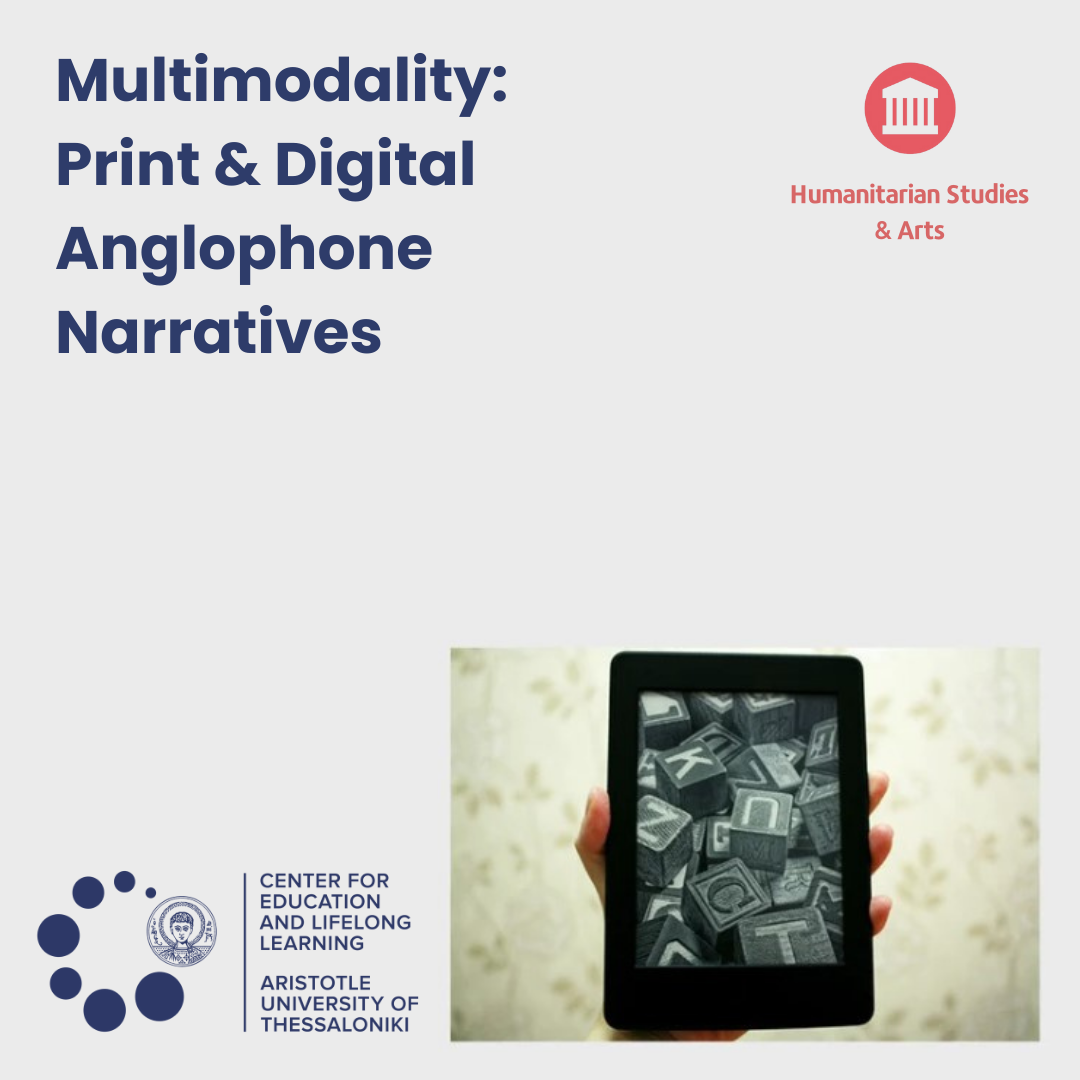2024-04-15 - 2024-05-30 ( 100 hours )
Remotely
Form Submission is completed on
Form Submission is completed on

The program focuses on the in-depth understanding of Anglophone literary multimodal storytelling with reference to a variety of multimodal narratives (print and digital) and digital applications. It is taught asynchronously in English and offers both synchronous and asynchronous feedback and guidance, while it provides learners the opportunity of flexible attendance and self-paced learning (asynchronous teaching and activities; synchronous/asynchronous communication and presentations).
The Scientific Coordinator of the program is Dr. Tatiani Rapatzikou, Associate Professor, Department of American Literature and Culture, School of English, Aristotle University of Thessaloniki (AUTh), Greece.
Duration: 100 hours
Language: English
ECTS: 3,5
Certificate: Specialized Training
Cost: €200
Discount: Two full scholarships available (see Discount Policy)
Teaching Staff
The program is delivered by the following members:
(Associate Professor, Department of American Literature and Culture, School of English, AUTh)
(PhD holder in American Literature and Culture, School of English, AUTh; Primary Education Teacher)
(Postdoctoral researcher in American Literature and Culture, School of English AUTh; Primary Education Teacher)
(PhD candidate, Department of American Literature and Culture, School of English, AUTh)
(PhD holder in American Literature and Culture, School of English AUTh)
(PhD candidate, Department of American Literature and Culture, School of English, AUTh)
(PhD candidate, Department of American Literature and Culture, School of English AUTh)
The program aims to:
Upon completion of the course, participants will acquire the following knowledge, skills, and abilities:
Knowledge:
Skills:
Abilities:
Since the program combines literary writing with digital technology and other media, it is addressed to alumni/a of various departments with a background in the Humanities & Liberal Arts (indicative domains: Greek and foreign literatures and cultures, pedagogy, fine arts, film, journalism and media).
Those interested in the program are required to submit their application electronically via the webpage of the Center for Education and Lifelong Learning, AUTh.
The following documents would need to be submitted to this email: multimodality@enl.auth.gr
In the selection of participants, the submission of all documents will be considered. Participants will also be selected on a first-come first-served basis.
Those selected to attend the course would need to have:
The program involves:
Asynchronous teaching
Asynchronous activities
Synchronous/Asynchronous communication
Synchronous/Asynchronous presentations
All asynchronous activities, program material and submission of assignments will take place via the AUTh’s digital platform Elearning.
All synchronous/asynchronous activities will take place via ZOOM (supported by AUTh).
The study material on a week-by-week basis includes:
[via a vpn connection; specific guidelines will be provided to the registered course participants before the beginning of the program].
The program provides to the course participants:
Obligations of Trainees:
Rights of Trainees:
After successful completion of the program, participants receive a Certificate of Specialized Training, which is issued by the Center for Education and Lifelong Learning AUTH and signed by the President of the Center.
Participants who have attended but not successfully completed the program, will be awarded a Certificate of Attendance.
For further information, please contact:
Thomas Mantzaris
Tel: 6972891989
Available hours: Mondays 10-12am and Thursdays 12.00-2.00pm
Email: multimodality@enl.auth.gr
Cost: €200
Additionally, the program offers two full scholarships. To be considered for a tuition waiver, applicants are required to submit a brief motivation letter in English (500 words), a transcript of grades from the BA and/or MA programs already completed as well as their most recent Tax statement (E1). The grade transcripts and E1 form can be in either Greek or English. If necessary, shortlisted applicants will be invited for a brief online interview.
Μπορείτε να εγγραφείτε στο Newsletter για να μαθαίνετε πρώτοι για τα νέα προγράμματα του ΚΕΔΙΒΙΜ ΑΠΘ.